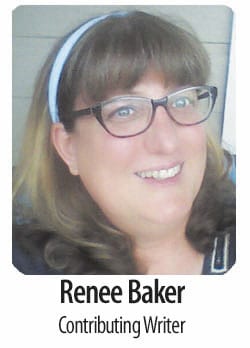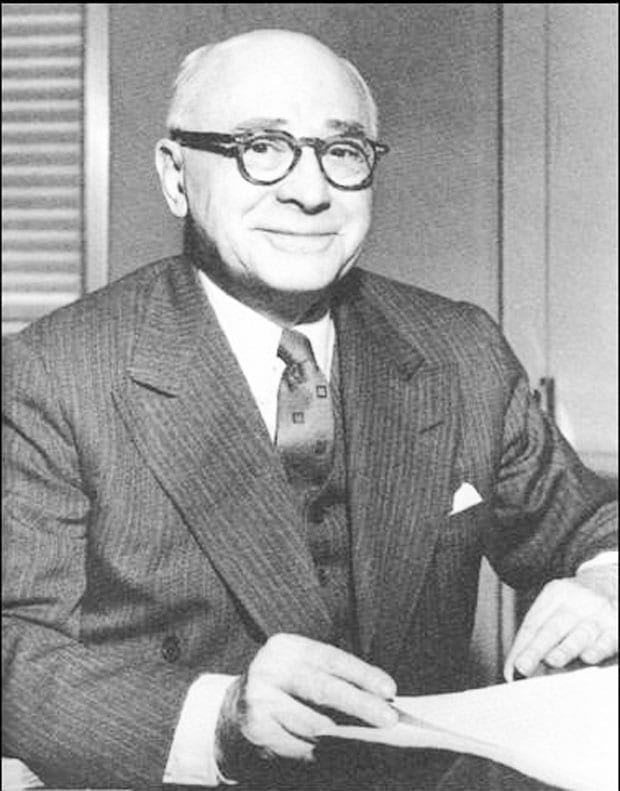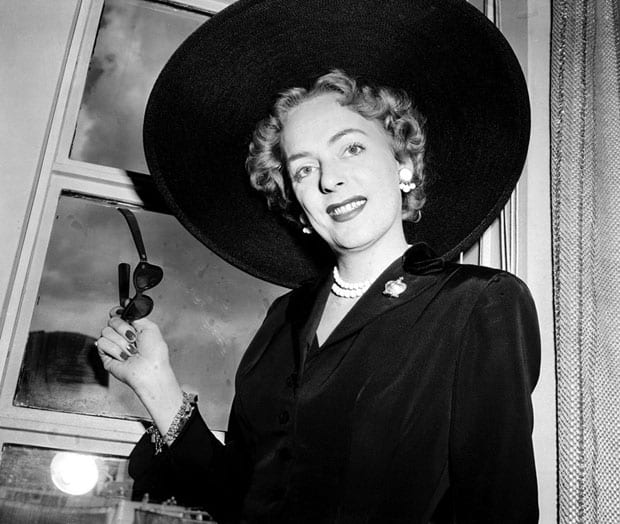 Renee Baker | Contributing Writer editor@dallasvoice.com
Renee Baker | Contributing Writer editor@dallasvoice.com
Editor’s Note: In honor of Transgender Day of Remembrance, Dallas Voice looks back at the legacy of “the father of transsexualism,” Dr. Harry Benjamin, and offers advice for transgender men and women and others in the LGBT community dealing with stress, fear and uncertainty in the wake of the 2016 elections. We also include here a list of TDOR events planned for North Texas.
Young people today may not have heard of her, but the rest of us history buffs readily recognize her name: Christine Jorgensen. More shocking in her day than Caitlyn Jenner is today, she rocked the world right off its gender foundation.
Jorgensen was no doubt considered a transsexual phenomenon in her day, becoming a celebrated figure in 1952 when the New York Daily News announced George Jorgensen’s transition with the oft-repeated headline “EX-GI BECOMES BLONDE BEAUTY.”
But if it were not for a medical doctor named Harry Benjamin, they may instead have been calling Jorgensen’s change instead, The Eonist Phenomenon. And if it were not for Christine Jorgensen, Harry Benjamin may not have become world-renowned as the “father of transsexualism” for his work with the gender-transitioning population.

We celebrate Harry Benjamin this year on the 50th anniversary of the publication his landmark and far-reaching book, The Transsexual Phenomenon, published by Julian Press in 1966, which cemented the term used for individuals reassigning their sex.
Born in Berlin, Germany in 1885, Benjamin was a strong 81 years of age when he challenged the prevailing medical establishment belief that cross-gender behavior was a disorder, and defended the health needs of the trans community with this groundbreaking work.
That said, Benjamin wrote, “After 50 years in the practice of medicine, and in the evening of life, I need not be too concerned with a disapproval that touches much more on morals than on science.”
Though he lived to the ripe old age of 101 and died in Manhattan in 1986, Benjamin wrote about transgenderism long before the grassroots term “transgender” became a household word in the 1990s. He had adopted the term transsexual long before the term was used as the name of a clinical disorder of the American Psychiatric Association. With Benjamin’s classic work, he essentially defined the term in the way most use it today.
Benjamin’s book fought back against the pathological attitude that was common towards trans individuals in that day when trans individuals were often viewed as neurotic or psychotic. It set the blueprint for how to treat trans persons in a standard way using cross sex hormones — namely estrogen for transgender women and testosterone for transgender men.
Over time, his guidelines became known as the Benjamin Standards of Care, originally published by the Harry Benjamin International Gender Dysphoria Association, named in his honor in 1979.
Benjamin was well known for advocating medical treatment, rather than reparative therapy. He stated with conviction, “Since it is evident, therefore, that the mind of the transsexual cannot be adjusted to the body, it is logical and justifiable to attempt the opposite, adjust the body to the mind.”
Today, the organization named after Benjamin is now known as WPATH, or the World Professional Association for Transgender Health, and is currently working on its eighth edition of the Standards. Dan Karasic, M.D., a board member of the organization, projects the new version to be out as early as October 2018.
Interestingly in 1949 San Francisco, Benjamin’s first transgender client was referred to him by sex researcher Alfred Kinsey. Kinsey is well known today for developing his Kinsey Scale, which indicates a degree of sexual orientation, ranging on a continuum from heterosexual to bisexual to having only same-sex attraction.
 Correspondingly, Benjamin described a similar way to categorize gender variant behavior on a spectrum. From one spectrum end he considered “lighter forms” to be that starting as in the “hippie movement,” with long-haired boys and trousered girls. Then, onto the cross-dresser who wants to wear clothes of the opposite sex, to the one who wants hormone therapy for further other sex characteristics, and on to finally the “true transsexual” who craves bringing the whole body into harmony with the mind, including gender-confirming surgery.
Correspondingly, Benjamin described a similar way to categorize gender variant behavior on a spectrum. From one spectrum end he considered “lighter forms” to be that starting as in the “hippie movement,” with long-haired boys and trousered girls. Then, onto the cross-dresser who wants to wear clothes of the opposite sex, to the one who wants hormone therapy for further other sex characteristics, and on to finally the “true transsexual” who craves bringing the whole body into harmony with the mind, including gender-confirming surgery.
Another interesting contemporary and colleague of Benjamin’s was Magnus Hirschfield, a well-known early activist on behalf of LGBT people. Together, according to historian Susan Stryker, the duo “visited homosexual and transgender bars in Berlin” when Hirschfield was writing the first book on cross-gender behavior, called The Transvestites: The Erotic Drive to Cross-Dress, published in 1910.
Stryker elaborates that it was precisely this German influence on Benjamin that shaped him to take a much less moralistic viewpoint than many of his contemporaries. Though he quietly helped trans individuals with their transitions for a number of years, it was Christine Jorgensen that propelled him into the limelight. Jorgensen was a patient of Benjamin during her transition.
In 1953, Benjamin was asked to write on the subject matter of Jorgensen and gender transitions. In discussing the etiology of the word “transsexual” he said, “I chose the term transsexualism for this almost unknown syndrome [instead of the word eonism].”
Christian Hamburger, a medical doctor on the Jorgensen transition team, had preferred to use the term “eonism.” It is safe to say, that this word did not catch on and instead Benjamin’s term transsexual became ubiquitous in his day.
Because Jorgensen was a worldwide phenomenon, and Benjamin wrote about her life, the term transsexual proliferated about the corners of the globe. Though today, most prefer a more nonclinical term, such as trans or transgender, the term transsexual was probably a good steppingstone for the era in which it was born.
Benjamin gave much credit to Jorgensen, who withstood public scrutiny for the rest of her life until she died — just a few years after he did, from bladder cancer, in 1989.
“Indeed Christine,” Benjamin wrote, “without you, probably none of this would have happened; the grant, my publications, lectures, etc. You will find me giving you credit in the book.” Benjamin was also known for his interest in the aging process. As a centenarian himself, he attributed his long life to good genes, living a sensible life and finding meaningful work. Benjamin indeed found work that meant a lot.
Renee Baker is a Licensed Professional Counselor in Dallas,
Texas and can be reached at www.renee-baker.com.
••••••••••••••••
Crisis? What Crisis?
Staying healthy, moving forward in the face of fear and hate and uncertainty
Unless you have been living in cold storage, you know we can cut to the chase: Our country and our community are in crisis.
We are living with a whole host of unknowns right now. The new administration set to take over the White House has not only unnerved practically every minority group in the country, it has the most anti-LGBT stance that many of us have ever seen.
This crisis is hitting especially hard on the transgender community, which arguably is at its pinnacle of empowerment since the Obama administration set a tone of advocacy — from equal opportunity in employment to groundbreaking educational protection for transgender children.
But the transgender community is also under fire like never before, with so-called “bathroom bills” targeting trans people still looming. Indeed, the Trans Lifeline crisis and suicide hotline number reports record numbers of calls since the day of the election.
Mara Keisling, executive director of the National Center for Trans Equality, said, “Transgender people and those who love us are understandably gravely concerned about what this election will mean for our families, our communities, our children, and our country.”
We can only imagine what could happen…
• Will I become the next victim of a hate crime?
• Will my gender markers on my legal documents be affected?
• Will I be allowed to use the right restroom? • Will my school safe spaces be closed?
• Will I lose my medical insurance?
• Will my legal name or gender marker change be denied?
• Will I be discharged from the military?
• What happens if the president-elect were to die?
• Will Title IX transgender protections in the schools be undone?
• Will OSHA transgender protections in the workplace or shelters be undone?
• Will our marriages hold or will our rights be annulled?
• Should I buy a gun or weapons to protect myself from the hate?
• Will our gender creative children be forced into reparative therapy?
• Will I lose my publicly-funded HIV or transgender health treatments?
• Should I delay coming out of the closet and wait to transition in four more years?
• Will I be deported or will my immigration be affected?
No doubt, all these unknowns and more add up to anxiety, panic and the feeling we are in a crisis. And that is exactly what we are in — crisis.
There is much at stake and this is not a time to get stuck in quicksand. It is a time to play ball. It is by taking action that we maintain the momentum we have had these last eight years of the Obama administration.
It is also how we honor those that got us to where we are at thus far and keep the ball rolling.
Donald won, Hillary lost. But we can’t let our joints rust from the tears we have cried in the last week. We absolutely can’t slide down that slippery slope of self-pity. There is a time for mourning, but we must move forward into the future, too.
This is the time for us to identify as a new champion — a new, bolder champion for human rights. It is going to take more energy, more muscle, more compassion. Be ready for it.
Crisis, I hate to say it, is not always a bad thing. The Chinese symbol for crisis is a compound of two words — danger plus opportunity. It’s an empowering way to look at it.
I’m not trying to sugar-coat the real danger we are in. I’m saying let’s capitalize on the opportunity at hand and see how we can use this electoral change to our advantage, and to the advantage of all.
In the art of Aikido, the energy of the enemy is not blocked; it is redirected into a new direction. You take advantage of their momentum, shifting it where you want it to go. We need to shift it in a direction of justice and equality.
Our goal should not be to destroy the enemy or the haters or label them as such. Our goal is to find ways to open their hearts and minds, to bring them into the present moment, where they can understand — nnot an easy task, as their egos can be strong, rooted in righteousness.
We have to look for calm openings in time when they are willing to listen, then you can redirect and take advantage of the momentum. We have to let them save face. We need to listen to their anger. We have to accept them where they are at in their own growth.
The strong haters out there, though,will want to put us to sleep. They want to make us invisible, make us go away. But we are not going to let that happen either.
We are going to energize ourselves and double are activist efforts. We are going to be alert and pay attention. We will read and engage, write and listen. We are going to continue to unite across multiple and diverse fronts.
Remember: United we stand, divided we fall. In the end, we all stand united, one world.
We have a big advantage over those that hate us: Hate is based in delusion. It’s full of fear. It is group think gone amuck.
Love and consciousness go together, hand-in-hand. We do not have just eight Obama years of momentum when it comes to consciousness; we have thousands of years in awakening. So, the hate will fade over time, as long as we don’t let them put us to sleep. Keep moving. Stay conscious and present. While fear is the mind-killer, self-pity is the sleeping pill.
Let’s affirm: “I do not wallow in fear and self-pity. I do not catastrophize over the “what if” list above. I fight for truth. I fight for justice and equality. I do not give into lies and hate. I am discerning in my judgment. I admit my mistakes. I am gracious. I give people an opportunity to grow and accept them where they are. I am loving and kind. I care.”
The Chinese have a well-known proverb, “It is better to light a candle, than to curse the darkness.”
Yoda would say, “Beacon of light, I am.”
Every minister has at one time taught their disciples, “The truth shall set you free.” We need to teach the haters. Hate-filled people are in pain and their band-aid is delusion. They may hate us, but the reality is that hatred is their own self-hatred projected onto us. Don’t take it personally; they need help. For them to change, they have to face their truth, rip the band-aid off and feel their pain. Compassion is needed here.
Together, now: “We are mindful and pay attention. We support our organizations. We help when they ask us for help. We call our local and state representatives. We keep ourselves well. We support each other. We are brave and courageous and take steps we have never taken before. We are grateful to our allies.”
We don’t want to go back to the 1960s. But in four more years, we do want to move liberally into a New Bolder Roaring Twenties!
So let’s do it. Commit to action. Empower yourself. Don’t let them take your power away and put you to sleep. Unite and embrace the blessing of diversity! And vote!
I’ll leave you with some inspiring words from Supertramp to whistle, from their 1975 album, Crisis, What Crisis?:
“And if my thoughts had wings,
“I’d be the bird that sings “I’d fly where love isn’t shy
“And everyone’s willing to try.”
Renee Baker is a licensed professional counselor in Dallas. She can be reached at Renee-Baker.com.
••••••••••••••••
TDOR Calendar in North Texas
Nov. 19: Transgender Day of Remembrance — Fort Worth
First Jefferson Unitarian Universalist Church, 1959 Sandy Lane Road, hosts a Transgender Day of Remembrance event from 7-9 p.m.
• Nov. 19: Parents of Trans Youth Workshop Youth
First, a program of Resource Center, hosts a workshop for parents and guardians of transgender and gender-non-conforming youth at Resource Center, 5750 Cedar Springs Road. Topics include psychological aspects of gender identity led by Sabine Rakos, medical aspects of transition by Dr. Ximena Lopez, advocating for trans youth led by Lou Weaver with Equality Texas, and a panel discussion with parents of trans youth. The workshop will be held from 10 a.m.-3 p.m., and is exclusively for parents and guardians of trans youth. Admission is free and lunch is provided. RSVP at ParentsOfTransYouth.EventBrite.com.
• Nov. 20: Transgender Day of Remembrance — Dallas
Black Trans Advocacy — Texas hosts a Transgender Day of Remembrance memorial event at Legacy of Love Monument, at the intersection of Oak Lawn Avenue and Cedar Springs Road, from 6-8 p.m.
• Nov. 20: Transgender Day of Remembrance — Denton
UNT Pride Alliance hosts TDOR in Denton from 7-9 p.m. at Denton Downtown Square, 110 W. Hickory St., Denton.
• Nov. 20: Transgender Day of Remembrance — Waco
InterWaco Community LGBT group hosts transsexual poet, playwright, artist and activist Alyssa Kerec Harley at a TDOR vigil from 3-5 p.m. at Heritage Square, 3rd Street and Austin Ave.
• Nov. 22: Trans-Cendence Trans/SOFFA Support meeting
Finn Jones is the speaker from 7-9p.m. At Horizon Unitarian Universalist Church, 1641 W. Hebron Parkway, Carrollton.

